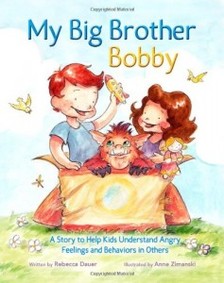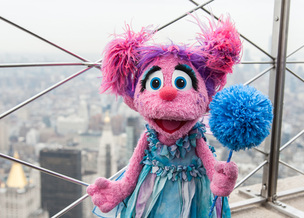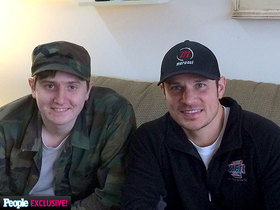 Being angry, seeing red, meltdowns, and freaking out are just a few words we have to describe what happens when a person loses control of themselves. My Big Brother Bobby: Understand Angry Feelings and Behaviors of Others by Rebecca Dauer helps siblings, classmates, friends and other family members to understand children who struggle with emotional and behavioral problems. For some of our children their lives or their environment become overwhelming. They just can’t deal with all the sensory bombardments and may act out, withdraw, become emotional, run, etc. My Big Brother Bobby is a fun, imaginative story that educates children on the importance of understanding and coping with anger in others in a warm and easy to understand way. It isn’t your typical children’s book. It is more of a communication bridge between parents, social workers, OTs, psychologists and children who are dealing with emotional issues, specifically those living with siblings with angry outbursts. Rebecca’s blog is a wealth of information about siblings of children with special needs. We thank Rebecca Dauer for her guest post introducing her book and agreeing to take part in our Author Interview Series. Lorna: Congratulations of your book, My Big Brother Bobby: Understand Angry Feelings and Behaviors of Others. What is the story behind this book? Why did you think a book on this topic was needed? <<Rebecca Dauer: The story behind the book is loosely based on stories from friends and family as well as my personal experiences. When I was younger, there was very little materials or outlets for siblings and I felt the need to change it. After doing research for the book, I found an immense amount of support from the sibling community. Everyone can relate to this book, whether it is a parent, sibling, cousin or friend who has a monster in their belly, it is hard on everyone and especially for young children. I wanted to bring to light the real struggles and emotions that children have and to bridge the communication gap for parents and health professionals.>> Lorna: You and the illustrator, Annie Zimanski, make a very good team. Annie’s illustrations bring your story to life! Usually how does the author of a picture book work with the illustrator? It seems to me there is a lot of communication that most go on to finish with a beautiful book like My Big Brother Bobby. <<Rebecca Dauer: Great question! I found Annie on elance.com after searching through several children’s book illustrators. I loved her work and she related well to the book. The first step in the process is to understand the story and then, creating the characters in the right medium. For example, they could look digital, acrylic or have a soft pastel look. Each change of color, character and background give a different look and feel to the book. Once the characters are built, then you break down each illustration by page with a sketch. Once each page is sketched and tweaks have been made, full color and background detail is added. Then there are a few final edits and that’s it! I enjoyed working with Annie and would recommend her to anyone looking for a great illustrator.>> Lorna: Is this your first book? You chose to self-publish it. What advice do you have for other authors who are thinking of self-publishing their book? <<Rebecca Dauer: Yes this is my first book. Self-publishing is a bit more streamlined and inexpensive because you don’t need an agent or wait until you are signed. If you have a PDF version of your book, you simple buy an ISBN and upload online. I used CreateSpace through amazon where books are purchased on demand. I was also able to add the book to the app store. I also became a member of the Independent Book Publishing Association (IBPA) for its resources and helpful guides into the publishing world. I recommend using those, becoming a member of IBPA, creating a website and promoting through social media.>> Lorna: In your book you mention a support organization for siblings, Sibling Leandership Network and the Sibling Support Project. Please tell us what they offer siblings. <<Rebecca Dauer: The SLN and the Sibling Support Project are completely dedicated to helping the siblings of children who are physically or mentally disabled. The SLN provides siblings of individuals with disabilities the information, support and tools to advocate for their brother or sister to promote the issues important to them and their entire family. They are also very involved in policy and advocacy. The Sibling Support Project headed by Don Meyer (who wrote a review for my book) is a national effort dedicated to the life-long concerns of brother and sisters of people who have special health, developmental, or mental health concerns. Sibshops are International and give children a community-based peer support program and provide awareness of siblings unique, lifelong, and ever changing concerns through workshops, websites, and written material. It is an amazing community and organization. If you would like more information, please visit below: -To keep reading the article please click: HERE
0 Comments
Here is an essay written by Stephanie. She is a sibling who has a brother that struggles with his behavior. She sometimes gets blamed for her brothers actions and has a hard time understanding why he does what he does. Read her story below:
Hello, I’m stephanie. I am 11 years old. My brother Aaron has a condition that they are trying to find, his behaviour can sometimes have a effect on people and my friend’s. His shouting, hitting and not sharing makes me feel upset and I’m often left out if he wishes to tag along. No matter how many times I try to explain and keep the peace a fight always breaks out and I’m left in the middle. My friends don’t understand his good side, his funny jokes and random kisses, they only see the bad side. It can hurt when I get blamed for my brothers actions when we go out to play on the drive but I know it’s not his fault. Mum and dad are always stepping in to stop arguments breaking out between the kid’s that live on our street over something Aaron as said or done. His new friend Charlie is patient with Aaron’s pestering,pushing and hitting because he knows Aaron is quirky. My dad is at work most of the time and my mum is cleaning up the mess my brother makes and tries to explain that he just want friends. I get upset when my mum cries when mums and dads start to shout my brother is a menace, I cry when im asked to leave him and play in their garden where he’s not allowed. Our home is Aaron. Mum and dad try to share their time between me and Aaron, iI love my brother but I don’t love his illness, nobody see’s the Aaron we know and LOVE, they see the menace To Read more click here: http://undiagnosed.org.uk/archives/3814 Some disabled children need help to behave well. This can be very annoying for siblings who can get fed up with coping with difficult behavior. Sometimes when your brother or sister behaves badly it may seem funny and it maybe makes you laugh. Sometimes you may tease your brother or sister and this may end up with them getting angry, throwing things or hurting you. The best thing for you and them is to encourage your disabled brother or sister to behave well. SOME THINGS YOU CAN DO ARE
To see the full article click here: http://www.youngsibs.org.uk/info/helping-your-brother-or-sister-to-behave-well/  The nonprofit behind Big Bird, Elmo and Abby Cadabby is launching a new effort to reduce stigma surrounding kids with autism and help those with the developmental disorder learn life skills. Through a new initiative dubbed “See Amazing in All Children,” Sesame Workshop said it will create digital tools to help children with autism learn to play with others and complete everyday activities like brushing teeth, getting dressed and trying new foods. In addition, the organization said it will use Sesame Street’s brand and characters to educate the public about autism and emphasize that kids on the spectrum are much like their typically developing peers. “This has become one of the most widely-discussed topics in childhood development, yet we have found that there’s a lack of understanding among the general public about children with autism,” said Jeanette Betancourt, Sesame Workshop’s senior vice president for community and family engagement. “Sesame Workshop has a long history of addressing diversity, acceptance and inclusion, and we felt we could play a critical role in reducing misconceptions by highlighting the commonalities children with autism share with all children.” Beyond its efforts aimed at children, Sesame Workshop said it also plans to work with Exceptional Minds, a Sherman Oaks, Calif. vocational center that teaches young adults with autism computer animation and post-production skills, to help create content. http://www.disabilityscoop.com/2014/04/04/sesame-street-autism/19257/  Nick Lachey once exposed his life for the reality-show cameras, but there was one topic that was kept off limits: his brother with Asperger syndrome. "It's a personal issue for me and my family," the singer tells PEOPLE of his brother Zac, who was adopted. Now 19, Zac was diagnosed at age 7. "It's something we've all been helping him with for a long time," his big brother adds. Lachey, 40, is speaking out as he launches the fifth-annual Lindt Gold Bunny Celebrity Auctionon Friday to raise funds and awareness for Autism Speaks. (The auction features porcelain gold bunnies signed by Lachey and such other celebs as Blake Shelton, Kelly Clarkson and Harrison Ford.) Zac, who lives with their mom Cate in Cincinnati, was diagnosed when he began having trouble learning in elementary school. "He wasn't learning in the same way as the other kids at school," says Lachey, who now lives in New York City with his wife, Vanessa, and their son, Camden, 18 months, for his new hosting VH1 gig, Big Morning Buzz Live. "They originally thought it was ADD. It took a while to narrow it down." At the time, Lachey was touring the country with his other brother, Drew, and their band 98 Degrees, and no longer living at home. It was stressful for his mom. "She was looking for answers more than anything else," Lachey tells PEOPLE. "Once she had them, she could learn to deal with it. It was more stress but at the same time, she could now understand how better to help him." As a teenager, Zac enrolled in the Cincinnati School of the Performing Arts, the same school his elder brothers had attended. "He studied technical theater and learned sound, which suited his interests," says Lachey. "And he made friends in the department." Still, he admits, "Social interactions can be a challenge for him. When he's focused on something, it's tough to get him off of it." Zac, he adds, "is highly functioning and very intelligent. A little introverted, but he's a sweet kid." To read more click here: http://www.people.com/people/article/0,,20803153,00.html |
AuthorRebecca is an independent publisher working to help siblings of children with emotional challenges. Archives
April 2017
Categories
All
|
My Big Brother Bobby: A Story to Help Kids Understand Angry Feelings and Behaviors in Others
 RSS Feed
RSS Feed
